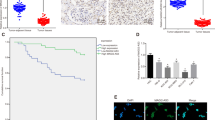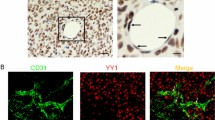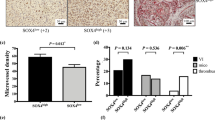Abstract
Tumor angiogenesis is a key step in the progression of gastric cancer (GC) that delivers essential nutrients and oxygen to tumor cells and distant sites. The cyclic AMP responsive element-binding protein 3-like 4 (CREB3L4) is a transcription factor highly expressed in multiple human cancers. This study aimed to investigate the regulatory effects of CREB3L4 on GC progression and angiogenesis. CREB3L4 was overexpressed in GC tissues and cell lines, and was positively correlated with advanced tumor stage and poor survival in GC patients. The upregulation of CREB3L4 in GC cells increased cell viability, promoted cell proliferation, reduced apoptosis, enhanced cell migration and invasion, and induced the formation of tubule-like endothelial structures, whereas CREB3L4 knockdown impeded tumor cell growth, attenuated cell motility, and prevented human umbilical vein endothelial cells from forming tubule-like structures. In addition, mice inoculated with CREB3L4-deficient GC cells showed significantly suppressed tumor growth compared to the group harboring wild-type tumors. Further analysis revealed that CREB3L4 expression was positively correlated with the level of vascular endothelial growth factor A (VEGFA) in gastric tumors. CREB3L4 regulated the transcription activity of VEGFA by binding to its promoter. The downregulation of VEGFA eliminated CREB3L4-induced GC cell growth and movement, and the formation of endothelial structures; while VEGFA upregulation greatly induced the growth and movement of GC cells with CREB3L4 deficiency. In conclusion, CREB3L4 promoted gastric tumor progression and endothelial angiogenesis by transcriptionally activating the VEGFA promoter, suggesting that therapeutic potential of the CREB3L4/VEGFA axis in GC treatment.
This is a preview of subscription content, access via your institution
Access options
Subscribe to this journal
Receive 12 print issues and online access
$259.00 per year
only $21.58 per issue
Buy this article
- Purchase on Springer Link
- Instant access to full article PDF
Prices may be subject to local taxes which are calculated during checkout







Similar content being viewed by others
Data availability
All data generated or analyzed during this study are included in this published article.
Change history
07 April 2023
This article has been retracted. Please see the Retraction Notice for more detail: https://doi.org/10.1038/s41417-023-00613-2
References
GBD 2017 Stomach Cancer Collaborators. The global, regional, and national burden of stomach cancer in 195 countries, 1990–2017: a systematic analysis for the Global Burden of Disease study 2017. Lancet Gastroenterol Hepatol. 2020;5:42–54.
Rawla P, Barsouk A. Epidemiology of gastric cancer: global trends, risk factors and prevention. Prz Gastroenterol 2019;14:26–38.
Gao K, Wu J. National trend of gastric cancer mortality in China (2003–2015): a population-based study. Cancer Commun 2019;39:24.
Chen W, Zheng R, Baade PD, Zhang S, Zeng H, Bray F, et al. Cancer statistics in China, 2015. CA Cancer J Clin 2016;66:115–32.
Rajabi M, Mousa SA. The role of angiogenesis in cancer treatment. Biomedicines. 2017;5:34.
Zuazo-Gaztelu I, Casanovas O. Unraveling the role of angiogenesis in cancer ecosystems. Front Oncol 2018;8:248.
Teleanu RI, Chircov C, Grumezescu AM, Teleanu DM. Tumor angiogenesis and anti-angiogenic strategies for cancer treatment. J Clin Med. 2019;9:84.
Claesson-Welsh L, Welsh M. VEGFA and tumour angiogenesis. J Intern Med 2013;273:114–27.
Hsu JY, Wakelee HA. Monoclonal antibodies targeting vascular endothelial growth factor: current status and future challenges in cancer therapy. BioDrugs 2009;23:289–304.
Qi H, Fillion C, Labrie Y, Grenier J, Fournier A, Berger L, et al. AIbZIP, a novel bZIP gene located on chromosome 1q21.3 that is highly expressed in prostate tumors and of which the expression is up-regulated by androgens in LNCaP human prostate cancer cells. Cancer Res 2002;62:721–33.
Inagaki Y, Yasui K, Endo M, Nakajima T, Zen K, Tsuji K, et al. CREB3L4, INTS3, and SNAPAP are targets for the 1q21 amplicon frequently detected in hepatocellular carcinoma. Cancer Genet Cytogenet 2008;180:30–36.
Pu Q, Lu L, Dong K, Geng WW, Lv YR, Gao HD. The novel transcription factor CREB3L4 contributes to the progression of human breast carcinoma. J Mammary Gland Biol Neoplasia 2020;25:37–50.
Washington K. 7th edition of the AJCC cancer staging manual: stomach. Ann Surg Oncol 2010;17:3077–9.
World Medical Association. World Medical Association Declaration of Helsinki: ethical principles for medical research involving human subjects. JAMA. 2013;310:2191–4.
Zhang Z, Li H, Zhao Y, Guo Q, Yu Y, Zhu S, et al. Asporin promotes cell proliferation via interacting with PSMD2 in gastric cancer. Front Biosci 2019;24:1178–89.
National Research Council Committee for the Update of the Guide for the C, Use of Laboratory A. The National Academies Collection: Reports funded by National Institutes of Health. Washington (DC): Guide for the Care and Use of Laboratory Animals; National Academies Press (US) National Academy of Sciences; 2011.
Steven A, Friedrich M, Jank P, Heimer N, Budczies J, Denkert C, et al. What turns CREB on? And off? And why does it matter? Cell Mol Life Sci 2020;77:4049–67.
Chan CP, Kok KH, Jin DY. CREB3 subfamily transcription factors are not created equal: Recent insights from global analyses and animal models. Cell Biosci. 2011;1:6
Levesque MH, El-Alfy M, Berger L, Labrie F, Labrie C. Evaluation of AIbZIP and Cdc47 as markers for human prostatic diseases. Urology 2007;69:196–201.
Kim TH, Park JM, Kim MY, Ahn YH. The role of CREB3L4 in the proliferation of prostate cancer cells. Sci Rep. 2017;7:45300.
Jing X, Liang H, Hao C, Yang X, Cui X. Overexpression of MUC1 predicts poor prognosis in patients with breast cancer. Oncol Rep. 2019;41:801–10.
Hsieh HL, Tsai MM. Tumor progression-dependent angiogenesis in gastric cancer and its potential application. World J Gastrointest Oncol 2019;11:686–704.
Nienhüser H, Schmidt T. Angiogenesis and anti-angiogenic therapy in gastric cancer. Int J Mol Sci. 2017;19:43.
Cui M, Kanemoto S, Cui X, Kaneko M, Asada R, Matsuhisa K, et al. OASIS modulates hypoxia pathway activity to regulate bone angiogenesis. Sci Rep. 2015;5:16455.
Shibuya M. Vascular endothelial growth factor (VEGF) and its receptor (VEGFR) signaling in angiogenesis: a crucial target for anti- and pro-angiogenic therapies. Genes Cancer 2011;2:1097–105.
Zhao Y, Adjei AA. Targeting angiogenesis in cancer therapy: moving beyond vascular endothelial growth factor. Oncologist 2015;20:660–73.
Xu W, Liang M, Zhang Y, Huang K, Wang C. Endothelial FAM3A positively regulates post-ischaemic angiogenesis. EBioMedicine . 2019;43:32–42.
Author information
Authors and Affiliations
Contributions
N.W. and Y.C. designed the study and supervised the data collection, C.S. analyzed and interpreted the data, Z.L. and H.X. prepared the manuscript for publication and reviewed the draft of the manuscript. All authors have read and approved the manuscript.
Corresponding author
Ethics declarations
Ethics approval
All procedures performed in studies involving human participants were in accordance with the standards upheld by the Ethics Committee of Gaozhou People’s hospital. All animal experiments were approved by the Ethics Committee of The first affiliated hospital of Zhejiang Chinese medical university.
Informed consent
Written informed consent was obtained from a legally authorized representative(s) for anonymized patient information to be published in this article.
Conflict of interest
The authors declare no competing interests.
Additional information
Publisher’s note Springer Nature remains neutral with regard to jurisdictional claims in published maps and institutional affiliations.
This article has been retracted. Please see the retraction notice for more detail:https://doi.org/10.1038/s41417-023-00613-2
Supplementary information
Rights and permissions
Springer Nature or its licensor (e.g. a society or other partner) holds exclusive rights to this article under a publishing agreement with the author(s) or other rightsholder(s); author self-archiving of the accepted manuscript version of this article is solely governed by the terms of such publishing agreement and applicable law.
About this article
Cite this article
Wang, N., Chen, Y., Shi, C. et al. RETRACTED ARTICLE: CREB3L4 promotes angiogenesis and tumor progression in gastric cancer through regulating VEGFA expression. Cancer Gene Ther 29, 241–252 (2022). https://doi.org/10.1038/s41417-021-00305-9
Received:
Revised:
Accepted:
Published:
Issue Date:
DOI: https://doi.org/10.1038/s41417-021-00305-9
This article is cited by
-
Cyclic AMP Responsive Element Binding Protein 3-like 4/AarF Domain Containing Kinase 5 Axis Facilitates Proliferation, Migration and Invasion of Lung Adenocarcinoma Cells by Modulating the TGFβ Pathway
Biotechnology and Bioprocess Engineering (2023)
-
Ginsenoside compound K inhibits the proliferation, migration and invasion of Eca109 cell via VEGF-A/Pi3k/Akt pathway
Journal of Cardiothoracic Surgery (2022)
-
Prognostic signature composed of transcription factors accurately predicts the prognosis of gastric cancer patients
Cancer Cell International (2021)



